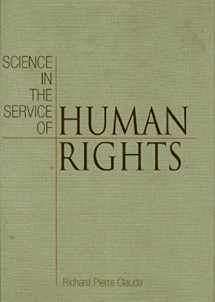
Science in the Service of Human Rights (Pennsylvania Studies in Human Rights)
Book details
Summary
Description
Named Best Book in Human Rights for 2003 by the American Political Science Association
Issues that mix science and politics present some of today's most daunting ethical questions. Did China violate the human rights of prisoners in 2001 by harvesting their kidneys and other organs without their formal consent? Do the victims of AIDS in sub-Saharan Africa have the right to effective pharmaceutical treatments that are beyond their financial reach? Have incautious steps toward human cloning trodden dangerously close to the revival of eugenics? Science in the Service of Human Rights presents a new framework for debate on such controversial questions surrounding scientific freedom and responsibility by illuminating the many critical points of intersection between human rights and science.
In the wake of the horrors of the Nazi engineers' grotesque experiments and the devastating advent of the atom bomb, the architects of the United Nations and the Universal Declaration of Human Rights sought to structure new world arrangements where those in power would be bridled by rational principles favoring peace. Though UN-formulated norms have slowly matured to the status of binding international law, the fragmentation of knowledge in modern society is such that few scientists know about the existence and content of the related UN declarations and covenants or their implications.
Richard Pierre Claude's book redresses this lack and satisfies curriculum development aiming to integrate human rights standards into the humanities, law, public health, and the social and physical sciences. It offers a systematic and much-needed clarification of the origins and meanings of everyone's right to enjoy the benefits of the advancements of science.


We would LOVE it if you could help us and other readers by reviewing the book
Book review



